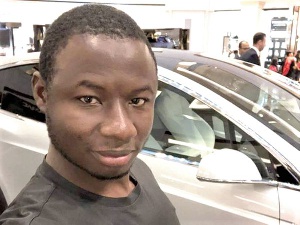Samuel Okudzeto Ablakwa, Member of Parliament, South Tongu, is appealing to investigative authorities to be more expeditious in bringing to justice those who slayed investigative journalist Ahmed Hussein-Suale.
“I also appeal to the authorities to provide regular updates so that it does not appear as though Ahmed’s death has been forgotten,” Mr Ablakwa said in a statement on the floor of Parliament, in Accra.
He added: “Beyond Ahmed, killing is the litany of physical attacks that too many journalists have had to suffer in recent years.”
Ahmed Hussein-Suale was a Ghanaian undercover investigative journalist and an associate of Ghanaian investigative journalist Anas Aremeyaw Anas.
The then 31-year-old journalist died on Wednesday, 16 January 2019, when unidentified men on motorbikes shot him three times, twice in the chest and once in his neck in his vehicle.
In a statement to mark the “United Nations’ Day to End Impunity for Crimes against Journalists,” Mr Ablakwa, who was a Deputy Minister of information under former President John Mahama, regretted that “impunity leads to more killings and is often a symptom of a worsening conflict and the breakdown of law and justice.”
“Mr Speaker, it is in recognition of the far-reaching consequences of impunity, especially of crimes against journalists, that the United Nations General Assembly adopted Resolution A/RES/68/163 at its 68th session in 2013 which proclaimed 2nd November as the ‘International Day to End Impunity for Crimes against Journalists.
“Mr Speaker, the resolution urged Member States to implement definite measures countering the present culture of impunity.
”The date was chosen in commemoration of the assassination of two French journalists Ghislane Dupont and Claude Verlon in Mali on 2nd November 2013.
“UNESCO, as well as other advocate groups are concerned that impunity damages whole societies by covering up serious human rights abuses, corruption, and crime. Governments, civil societies, the media, and everyone concerned to uphold the rule of law are being asked to join in the global efforts to end impunity especially against journalists,” Mr Ablakwa said.
Mr Ablakwa recounted a checkered history of the media in Ghana, and noted that there was a period of “culture of silence”, but Ghana now boasts of a vibrant and pluralistic media, which are striving to perform their functions of keeping the citizenry informed, ensuring that public officers are accountable and leading causes for societal progress, a situation the MP advocated for all to be concerned about as democrats.
He chronicled a series of attacks on some journalists in Ghana this year, with their accompanying trauma which left permanent scars, for which the MP declared: “I believe our dear country can do better in swiftly apprehending culprits and handling down severe punishment.”
Mr Ablakwa called for decisive steps to address recurrent attacks against journalists, noting that some law enforcement agencies which were tasked with protecting the rights of citizens, flouted rules with impunity and “if left unattended, may not only be spelling doom for journalism, but also for all citizens. “
The South Tongu Legislator highlighted other forms of impunity against journalists as denying them decent working conditions, Government deliberate boycott of media platforms, and denying them adverts to financially emasculate them.
He appealed to the National Media Commission, a Government of Ghana agency mandated with the responsibility of registering, regulating and monitoring the activities of media houses in Ghana, to do more in defending the liberties of journalists and ensuring that those who harmed journalists found no peace.
He proposed the establishment of a special fund to support journalists who came under attack by way of their medical bills to aid them recover and by way of their legal bills in pursuit of justice.
Members who contributed on the statement called on the journalists to be steadfast, not to be threatened by people who had something to hide and urged media practitioners to be guided by the tenets of the profession.
They also asked people with grievances against journalists to use legal channels including the National Media Commission and the courts.
General News of Wednesday, 6 November 2019
Source: ghananewsagency.org
Intensify search for Suale’s killers, punish impunity against journalists - Ablakwa
Entertainment
















